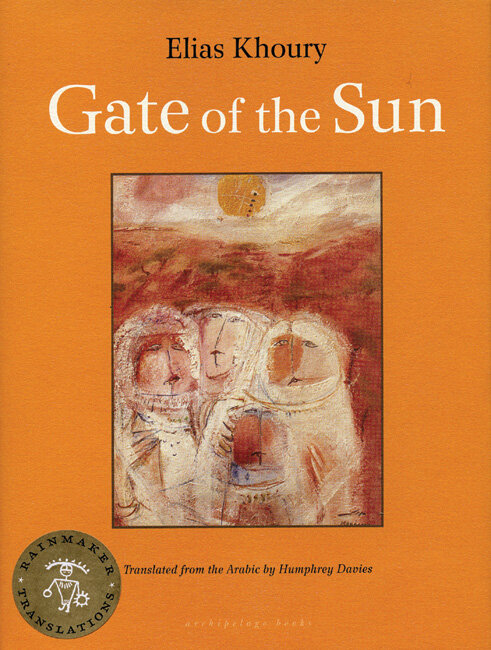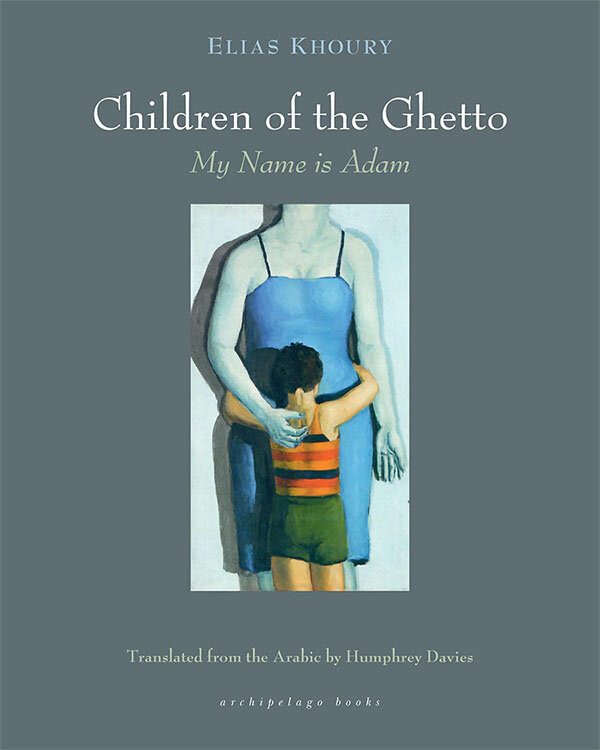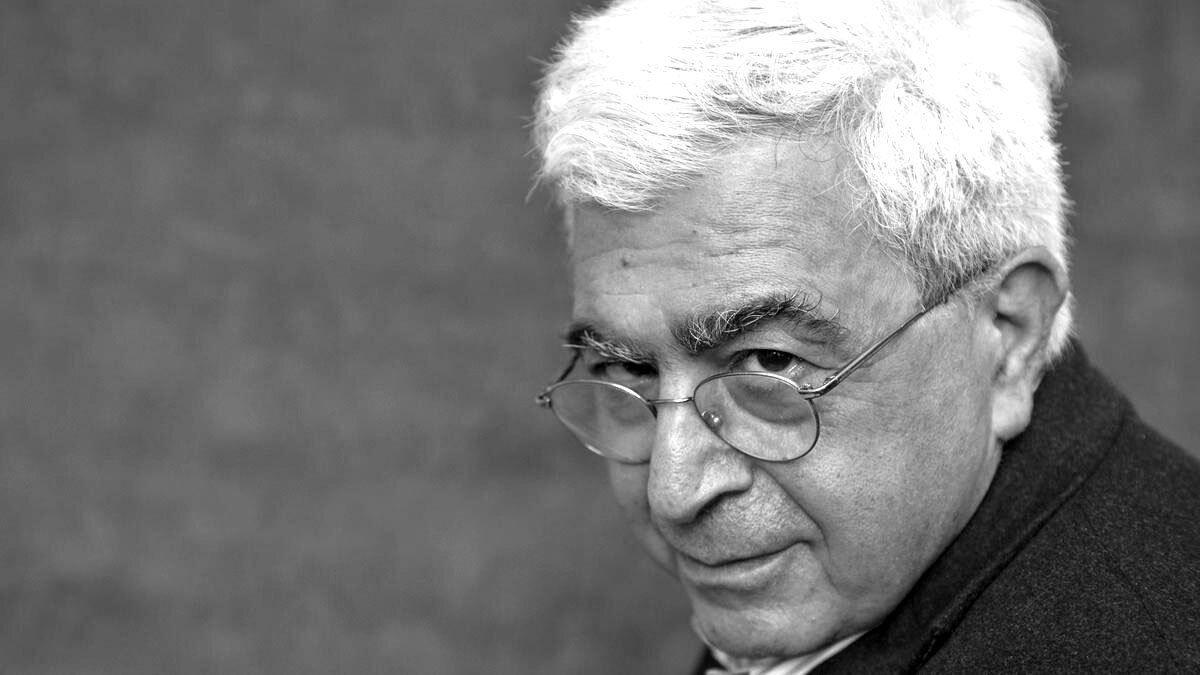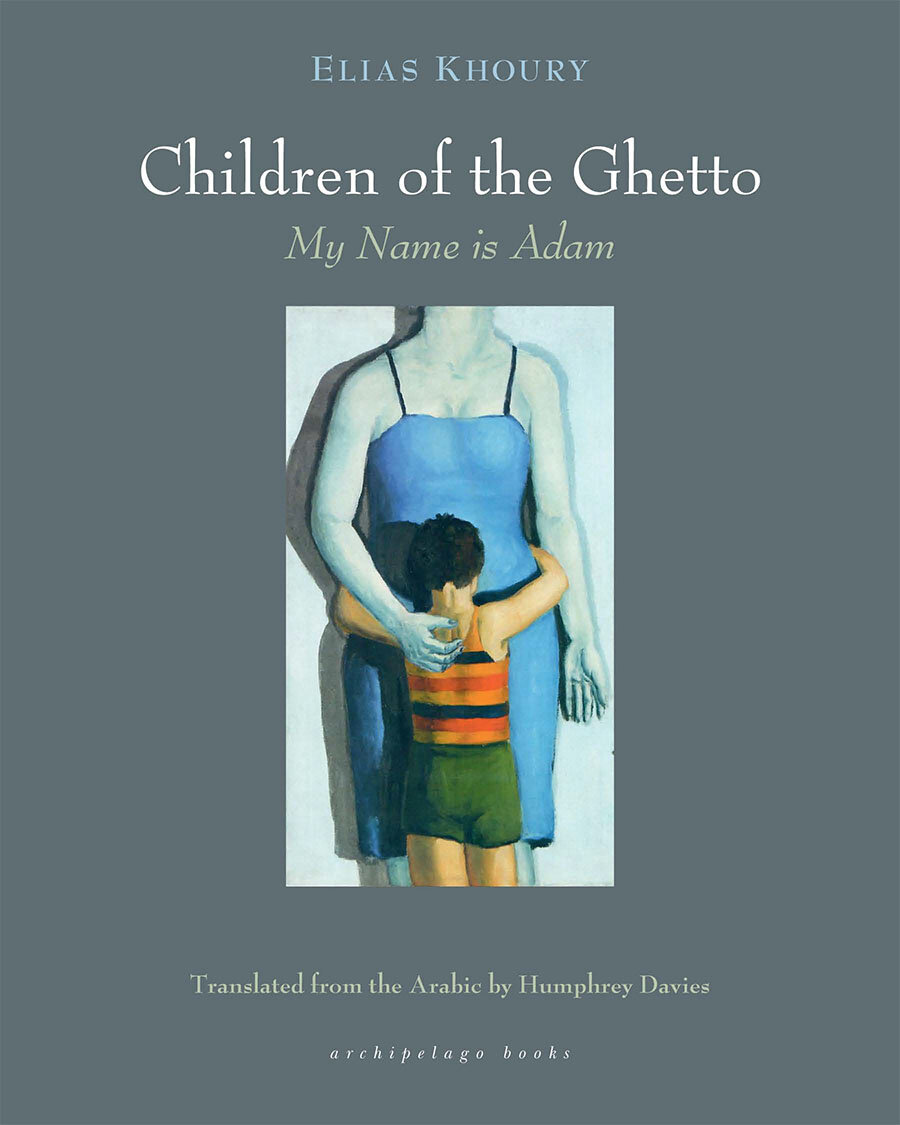Elias Khoury
Children of the Ghetto: My Name is Adam, a novel by Elias Khoury
First of a trilogy, translated from Arabic by Humphrey Davies
Archipelago Books 2019
ISBN: 9781939810137
New York’s nonprofit press par excellence, Archipelago Books, was among the first in the United States to translate and publish the oeuvre of Lebanese novelist Elias Khoury, beginning in 2006 with his beautiful classic Gate of the Sun (Bab al Shams)—the first magnum opus of the Palestinian Nakba or catastrophe of 1948. Khoury continues his exploration of the 20th century tragedy with My Name is Adam, a story about Palestine’s 1948 exodus:
Long exiled in New York, Palestinian expat Adam Dannoun thought he knew himself. But an encounter with Blind Mahmoud, a father figure from his childhood, changes everything. As he investigates exactly what occurred in 1948 in Lydda, the city of his birth, he gathers stories that speak to his people’s bravery, ingenuity, and resolve in the face of unimaginable hardship.
A comment from Goodreads:
The reader will notice that these notebooks contain texts that are incomplete, a mating of novel and autobiography, of reality and fiction, and a blending of literary criticism with literature…it mixes writing with outlining and blends narration and contemplation, truth and imagination, as though the words have become mirrors to themselves, and so on and so forth. —Paul Fulcher
A comment from the Author:
THESE NOTEBOOKS CAME into my possession by coincidence, and I hesitated at length before deciding to send them to Dar al-Adab in Beirut for publication. To be honest, my hesitation lay in that ambiguous feeling that combines admiration and envy, love, and hate. I had met the writer and hero of these texts, Adam Dannoun – or Danoun – in New York, where I teach at the university. —Elias Khoury
The Will
Children of the Ghetto, My Name is Adam by Elias Khoury is available from Archipelago.
Excerpted from Children of the Ghetto, My Name is Adam
By Elias Khoury
I SIT ALONE in my fifth-floor room, watching the snow falling on New York. I don’t know how to describe my feelings looking out this rectangular window in whose glass I see my soul refracting. It has become my mirror, in which my image loses itself among the other crowding images of this city. I know New York is my last stop. I shall die here and my body will be burned and my ashes scattered in the Hudson River. This is what I shall request in writing in my will: It’s true I do not have a grave waiting in the country I left behind and cannot be buried there, in the arms of the spirits of my ancestors. In this river, I shall embrace the spirits of strangers and encounter those who find, in the meeting of stranger with stranger, a lineage to replace one they’ve lost. (I realize I’ve just turned two lines of Imru’al-Qays’s poetry quite unpoetically into prose but I don’t care: no one is going to read these words after my death because I shall ask in my will that these notebooks be burned along with me, so that they too can be thrown into the river. Such is the fate of man, and of words: words die too, leaving behind them an expiring wail like the one our souls give out as they disappear into fog at the end.)
I’ve made this window my mirror so that I don’t have to look at my face in an actual mirror – my face dissolves into the other faces, my features vanish, and thus I fashion an end for the end that has chosen me and put an end to the dream of writing a novel that I don’t know how to write or even why I should. The novel was lost to me the moment I thought I’d found it. That is how things are lost. It’s how Dalia – the woman who vanished from my life at the very moment when I believed that I could write my life in her eyes, and who’d agreed we should have a child and start – was lost. The beginning, or what we thought was the beginning, was the end. However, the true beginning, which led me to leave my country, seemed more like a false start, when I imagined I could find a substitute for life in writing it. This delusion seized me when the Israeli film director, who was my friend because he spoke the language I’d resolved to forget, suggested that every individual’s life deserves to be a novel or a film.
I’ve put my notebooks in this file and I shall ask that they be burned and their ashes placed in a bottle, and I shall ask my young friend to mix their ashes with mine before everything is thrown into the river. Strange, my relationship with this young woman who came out of nowhere, and who is nowhere still! Did she love me, or did she love her New York University professor? Or did she love the idea of love, allowing it to rise above the two of us?
When I decided to emigrate to New York, I was determined to forget everything. I even decided, at the moment when I obtained my US citizenship, that I’d change my name, though it looks as though I’ll die before that happens. Death is a right. I’m not ill. Nothing requires that I think of death so unceasingly. Normally, it is the sick and the elderly who die, and I am neither. I’m over fifty and on life’s last lap, as they say. My lust for life has become sluggish due to a woman who decided, in a moment of insanity, to abandon me and her love for me – and she was right: we have to make sure we abandon things before they abandon us. I, though, have begun to rediscover how lust creeps into our joints – and I don’t just mean sex, I mean everything, but especially the lust for vodka and wine that sweeps over me, so that I feel a tingling in my lips and my ribcage as I sip the first drop.
A renewed lust for life stationed on the shores of death is a paradox that throws me into confusion, but I know that death will be victorious in the end, for death is vested in me and cannot be defeated.
The death whose phantom I see before me isn’t born out of despair at anything. I live in the post-despair age and am neither despairing nor lonely. I have fashioned my own despair and made of it a shade under which to take refuge, one that protects me from naivety and futility. My solitude has been a deliberate choice: as soon as I finish work, I return to my room and start writing. Writing is my solitude, it is my only address. I had failed to write the novel that I wanted to, so I decided to create a great metaphor, a cosmic metaphor, that of an obscure Arab poet who lived in the Omayyad period and died a hero’s death – and then suddenly I discovered that metaphors are futile. New York has taught me that nothing in our world is original or authentic, everything has been borrowed, or so it seems to me. Why should I write yet another metaphor to add to the others?
At first, I wrote the metaphor that I’d chosen to express the story of the country from which I’d come. Later, having decided that metaphors were futile, I didn’t tear up what I’d written, but reworked parts of it to allow me to recount the circumstances in which the idea had been born, and the reasons for it. Then, in an absolute fury, I decided to abandon the metaphor altogether, stop writing the novel, and devote myself to my own story, so that I could write the unadorned truth, stripped of all symbols and metaphors. No doubt I’ve failed to realize my new goal, but I uncovered many things as I was writing that had escaped my memory or sunk into its folds. Memory is a well that never runs dry, it both reveals and conceals, either so that we may forget when we are not able, or so that we may remember when we forget, I really don’t know!
I don’t recall ever reading anything about the relationship between anger and writing, but my decision to write my own story was a result of rage, a savage rage that overwhelmed my being and that had two, unconnected, causes. One was my meeting with Blind Ma’moun, whose fragmentary story about my parents stunned me. It meant nothing to me at first but began to assume terrifying proportions following the visit of Israeli director Chaim Zilbermann to the restaurant and his invitation to attend the screening of his film Intersecting Glances. There – and this was the second spur of my rage – I witnessed the story of my friend Dalia being torn to pieces, followed by the author of the novel Gate of the Sun standing next to the bald Israeli director, presenting himself as an expert on Palestinian history, and lying.
Both of them told lots of lies, and I couldn’t restrain myself from shouting at them and leaving the cinema, Sarang Lee at my side. She took hold of my arm and led me to the café, but instead of supporting me, she started explaining that I was in the wrong.
It’s true. I was in the wrong, and what I’ve written is a record of my mistakes. I’ve written of both my rage and my errors. I told myself it was my duty, that I had to end my life with a story. Ultimately, all of us live to become stories. This is why I wrote so much, only to discover that silence is more eloquent than words and that I want these words to be burned.
All the same, I am a coward. I’m incapable of committing suicide, incapable of sending these notebooks to their death, and incapable of going back to my country to recover my soul – as Karma, a Palestinian woman I got to know as a sister, and who then disappeared from my life, advised me to do. I ran into Karma again by coincidence here in New York and promised her I would, but I don’t know, I may not be sincere. I’m not sincere I guess, I don’t really know, which is why I gave Sarang Lee a short letter and asked her not to open it unless something should happen to me, and why I burdened her with the job I’d been unable to carry out and asked her to burn these notebooks after my death.
I’m not certain I really want the flames to consume these papers, but it’s too late now, which is better. I am sure that the little sun that has illumined a small part of the darkness of my soul will do what it thinks is right.
I hesitated at length before making up my mind not to send these papers to any Arab publishing house, not because I don’t believe that what I’ve written is important but out of despair at the relationship between writing and the world of publishing, where writers rush to seek immortality for their names. I don’t believe in immortality, of souls or of words: it’s all vanity. The vanity of vanities, as Solomon wrote, is us. I don’t know how poets and authors can dare to write, after The Song of Songs and Ecclesiastes! The writer who was a prophet, a king, and a poet, the lover who loved all women, the mighty ruler who reigned over the kingdoms of the jinn, wrote that “all is vanity,”so why add my vanity to his?
I’m sitting alone now. My window is open onto the mirrors of the snow. I inhale the whiteness and listen to the crying of the winds that bluster down the streets of New York. I sip a drop of wine and take the smoke of my cigarette deep into my lungs. I open my notebooks, read, and feel thorns in my throat. I close the window and shut my eyes. My story is like thorns, my life is words, and my words are gusts of wind.
<
 Elias Khoury, along with Mahmoud Darwish, is an artist giving voice to rooted exiles and trapped refugees, to dissolving boundaries and changing identities, to radical demands and new languages. From this perspective Khoury’s work bids Mahfouz an inevitable and yet profoundly respectful farewell. Order here.
Elias Khoury, along with Mahmoud Darwish, is an artist giving voice to rooted exiles and trapped refugees, to dissolving boundaries and changing identities, to radical demands and new languages. From this perspective Khoury’s work bids Mahfouz an inevitable and yet profoundly respectful farewell. Order here.
— Edward Said
“Yalo establishes Khoury as the sort of novelist whose name is inseparable from a city. Los Angeles has Joan Didion and Raymond Chandler, and Istanbul, Orhan Pamuk. The beautiful, resilient city of Beirut belongs to Khoury.” Order here.
—Laila Lalami, Los Angeles Times Book Review
“No Lebanese writer has been more successful than Elias Khoury in telling the story of Lebanon . . . Khoury is one of the most innovative novelists in the Arab world.” Order here.
—Washington Post Book World






 <
<